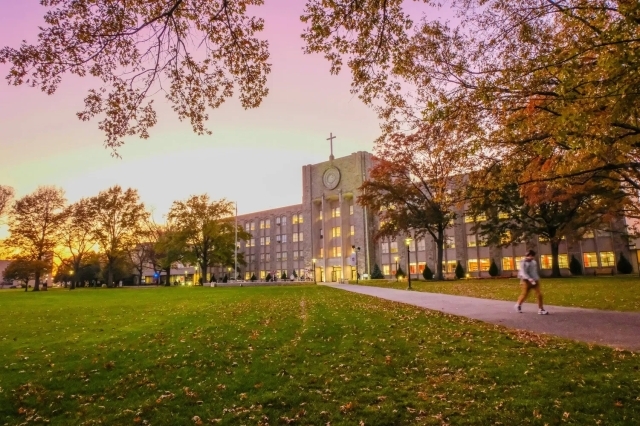

SCHOLARIUM Interdisciplinary Journal
- Home
- Academics
- Our Schools and Colleges
- The Lesley H. and William L. Collins College of Professional Studies
- SCHOLARIUM Interdisciplinary Journal
About
Scholarium is a peer-reviewed, open access, academic journal that publishes original papers, authoritative reviews, research reports, and information, and aims to foster interdisciplinary initiatives. The journal is managed by students and supervised by the faculty.
The Journal's Mission
The journal’s mission is to publish innovative empirical, theoretical, and review articles focused on human rights, civil rights, and social justice. Submissions are encouraged from a range of areas and divergent viewpoints in a readable fashion for those concerned and interested in current affairs.
About St. John’s University
As a metropolitan university, St. John’s benefits from New York City’s cultural diversity, its intellectual and artistic resources, and its unique professional educational opportunities. With this richness comes responsibility. We encourage the metropolitan community to use our resources to serve its needs.
As a global university, we are one of our nation’s most diverse institutions of higher education, enriched by a mixture of cultures, which complements an internationalized curriculum. Through collaboration with other institutions around the world, study abroad opportunities, and online courses and degrees, our outreach spans the globe.
In educating students, we pledge to foster those qualities needed for our alumni to become effective leaders and responsible citizens in a vibrant city and dynamic world.
About Collins College of Professional Studies
The Lesley H. and William L. Collins College of Professional Studies (CCPS) develops well-rounded professionals capable of integrating theoretical knowledge with applied concepts learned through classroom, practice, online activities, local and global service-learning, and academic and career-focused internships.
Innovative and fast-paced professional programs—in administration and economics, analytics, communications, computer science, criminal justice and homeland security, information technology, journalism, media, sport management, and more—embed foundational social sciences topics in the various professions, cultivating both general and specialized competencies.
The College attracts a cadre of students with multicultural backgrounds who enrich our community. CCPS faculty and staff are dedicated to the success of each student, and carefully customize academic paths to match individual interests and credentials with the skills needed in our evolving society.
About Scholarium
Co-Editor-in-Chief: Sophie Gangi
Co-Editor-in-Chief: Afua A. Twumasi-Ankrah
Other members of the editorial board:
Miriam Prever
Emily N. Hartwig
Myrophora Christo
Desislava Stoeva
Alexandra Gray
Victoria O'Keefe
Topics in the Global Sport Industry
It’s my pleasure to invite you to submit a paper for inclusion in a special issue of the SCHOLARIUM Interdisciplinary Journal Sponsored by The Lesley H. and William L. Collins College of Professional Studies (CCPS) at St. John’s University.
Abstract Due By: February 10, 2025
Submission Deadline: March 3, 2025
Theme: The field of sport management is constantly evolving, influenced by technological advancements, changing sociocultural trends, global events, and increasing demands for sustainability and inclusivity. This special issue of SCHOLARIUM aims to gather innovative research that explores the latest concepts, practices, and challenges in sport management. We invite scholars, practitioners, and industry experts to submit fully developed papers and abstracts that reflect diverse perspectives and methodologies.
Topics of Interest:
SCHOLARIUM welcomes abstracts addressing, but not limited to, the following themes:
- The role of technology in sport management (e.g., data analytics, fan engagement, VR/AR applications)
- Social Media and its impact on Sports Marketing and Branding
- Sustainability practices in sport organizations
- Diversity, equity, and inclusion in sport management
- The influence of global sporting events on local economies and cultures
- Emerging trends in sports finance and sponsorship
- Athlete management and well-being in a rapidly changing landscape
- Crisis Management and resilience in sports organizations post-pandemic
- Innovations in sports event management and fan experiences
- Policy implications of sport management in the context of public health
Submission Guidelines:
- Submissions must follow APA Style, Seventh Edition
- Manuscripts must be in English.
- The author’s name should only appear on the cover page, as manuscripts are evaluated anonymously.
- An abstract of no more than 500 words should be included at the beginning of the article.
- The full paper should be between 2,000 - 3,000 words.
- Authors are responsible for obtaining any copyright permissions.
Submissions/questions may be emailed to [email protected]
Submission Guidelines:
- Submissions must follow APA Style, Seventh Edition
- Manuscripts must be in English.
- The author’s name should only appear on the cover page, as manuscripts are evaluated anonymously.
- An abstract of no more than 500 words should be included at the beginning of the article.
- The full paper should be between 2,000 - 3,000 words.
- Authors are responsible for obtaining any copyright permissions.
Afua A Twumasi-Ankrah
Co-Editor-in-Chief
Sophie Gangi
Co-Editor-in-Chief
